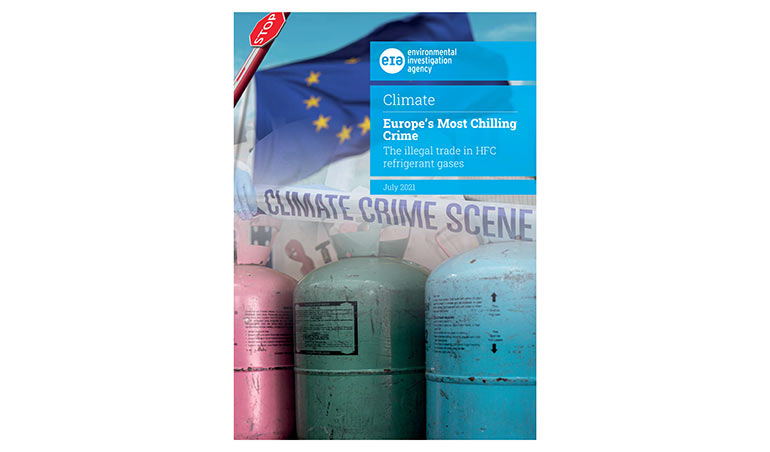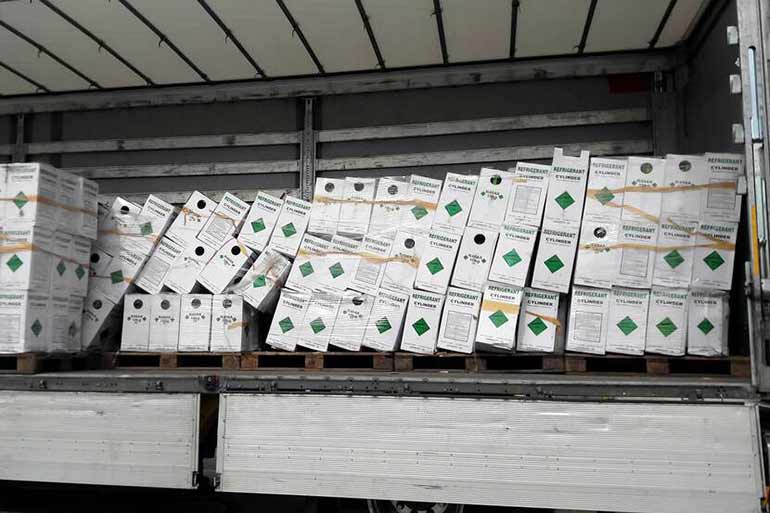EIA exposes corruption in Romania’s criminal HFC trade
8th July 2021
UK: The Environmental Investigation Agency has uncovered “systematic corruption” of customs officials in the illegal importation of refrigerants into Europe, with Romania identified as one of the major entry points.
The shocking new report, Europe’s Most Chilling Crime – The illegal trade in HFC refrigerant gases, pinpoints Romania as a major illegal entry point for Chinese-made HFCs, smuggled via Turkey and Ukraine. It highlights corruption of customs officials, misuse of the EU’s transit procedure, a blatant disregard for F-gas quotas and a ready availability of contraband material.
In the undercover investigation, the EIA identified Romania as a key EU member state being used as the entry point for illegal HFCs directly from neighbouring Ukraine and from Turkey via Bulgaria. Once inside Romania, the HFCs are destined for bigger markets such as Germany, Spain, Belgium, Italy, France and the UK. The illegal traders are also said to have revealed the existence of cross-border networks of companies and individuals in Romania, Turkey and end markets such as Belgium and France.
One smuggling method identified involved several companies in Romania collectively purchasing large consignments of HFCs sent from China to Turkey, which are then split up and moved into Romania, most likely via Bulgaria.

During its investigations, the EIA found no shortage of suppliers willing to break the law to supply smuggled HFCs, at times offered in illegal disposable non-refillable cylinders.
Meetings with individuals claiming to be experienced traders revealed routine bribery of border officials and the use of vans, refrigerated trucks and passenger coaches to transport consignments of HFCs. Four traders spoken to by the EIA mentioned the use of bribes of €20-30 per cylinder to customs officers when importing HFCs from Ukraine.
Disposable cylinders
Initial investigations saw the EIA targeting online trading platforms such as Alibaba, eBay, Milanuncious and OLX to identify illegal traders offering refrigerant at well below market prices. Some vendors were openly displaying images of HFCs in illegal disposable cylinders. Although, aware that disposable cylinders were now more likely to be detected by customs officers, some black marketeers have switched to refillable cylinders.
Inside Romania, the EIA claims to have spoken to the director of Eurotek Chemical, an online refrigerant sales company based in Bucharest who, it is alleged, openly admitted to dealing in disposable cylinders of R134a and R404A, smuggled from Ukraine with the help of corrupt border guards. The EIA report claims he was willing to supply investigators with five tonnes of R134a, and also offered to sell R22, the ozone-depleting refrigerant banned in the EU since 2010.
Investigators also met with the owner of Frigotherm Expert, a Bucharest-based contractor, who the EIA says claimed to be able to source illegal HFCs in disposable cylinders from Turkey, with his supplier bribing border guards.
In another case, a Romanian e-commerce website, Eurorefrigerant.ro, is alleged to have been willing to supply five tonnes of R134a in disposable cylinders. In a subsequent offer, the company contact is said to have used an email address linked to a company called EMG Invest. EMG Management Invest, registered as a new-entrant HFC quota-holder in 2019, was implicated in the seizure of 76 tonnes of R134a and R404A by Romanian authorities in June 2020.

Ten tonnes of R404A seized by Dutch customs in 2020 were imported from Turkey and destined for Belgium
The customs documents related to that seizure revealed they were destined for five different consignees in Romania; four of them were not F-gas registered to receive imports, while the fifth would have significantly exceeded its quota for 2020. The EIA maintains that information received from Romania’s Environmental Guard indicated that EMG Management Invest was the fifth consignee.
Investigations in the Suceava region on the border with Ukraine, an apparent hotbed for the illegal trade, revealed possible links to organised crime. There, a number of traders identified through the online trading platform OLX, offered varying amounts of R404A and R134a in disposable cylinders. They admitted to previously smuggling illegal refrigerant into Belgium, Spain, Germany, Italy and England. One indicated that shipments would be split and loaded onto passenger coaches travelling disguised as luggage in raffia or in black bin bags.
Turkish connections
EIA investigators also spoke to Turkish supply companies. In spring 2020, the EIA contacted the Lima Group, a Turkish trading company offering HFCs and car accessories for sale online, requesting 500kgs of HFCs to be shipped to an EU destination. The company representative explained his stock had already been sent to Europe and suggested the EIA investigator buy directly from his company in Belgium.
In September 2020, Dutch authorities seized 10 tonnes of R404A in a truck in the Netherlands. The refrigerant had been imported from Turkey and was destined for Belgium. The importer was not in the HFC Registry and did not have quota. The HFCs were incorrectly labelled and loaded and the driver of the vehicle did not have the required dangerous goods transport documents and certification. According to the EIA, the importer was associated with the Lima Group.
Import discrepancies
As the world’s largest producer of HFCs, China is seen as the original source of most, if not all, the illegal refrigerant entering the EU. However, exports to countries bordering the eastern EU countries, several of which have been identified as likely sources for HFCs entering the EU illegally, have grown by 96% since 2014.
European customs import data for Turkey, another key source country for Chinese-made HFCs entering the EU without quota, also records huge recent increases in imports from that country.
According to the EIA, 38 tonnes of HFCs were imported to the 28 member states from Turkey each year between 2007-13. EU reported HFC imports from Turkey began to grow in 2014, peaking at 1,002 tonnes in 2018, the year that a significant illegal HFC trade emerged. Turkey’s own export data suggests substantially higher exports to the EU. The discrepancies between European customs HFC import data and Turkish HFC export data have steadily increased since 2016. In 2020, the EU reported imports of 160 tonnes of HFCs from Turkey, while Turkey reported exports to the EU of 706 tonnes of HFCs to the EU.
The EIA states that the findings of its investigations were supplied to the relevant enforcement agencies before publication.
Europe’s Most Chilling Crime – The illegal trade in HFC refrigerant gases can be viewed and downloaded here.







